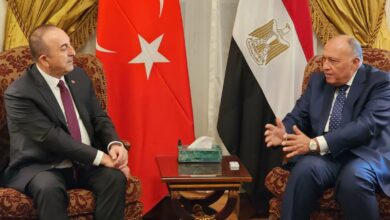The Islamist who commands one of Libya's most powerful militias, Abdel Hakim Belhadj, said on Monday he will back the interim national government despite his supporters being overlooked for top posts.
But he would not commit to a date for the forces under his control to hand over their weapons to the government, a crucial test of whether Libya after the fall of dictator Muammar Qadhafi can form a cohesive state.
Some analysts had warned that caretaker Prime Minister Abdurrahim al-Keib risked sparking a confrontation with Belhadj's Islamists after he handed the defense minister's post in the new government to the head of a rival militia.
Speaking at the luxury hotel overlooking Tripoli's port where he has his headquarters, Belhadj said he had not put his name forward for any cabinet post, and had been consulted about appointments for the most powerful jobs.
"I hope that it (the new government) will be granted all the support needed for it to carry out its tasks. I am aware of certain opinions accusing it of being imbalanced in terms of representing all regions, but we hope that it would be allowed to carry out its duties to render the country stable and secure," he said.
"As revolutionaries, we are concerned with supporting this government and all the ministers including the defense minister. We will coordinate and cooperate with the defense ministry … Our relationship with the defense minister is good."
Local rivalries
Belhadj is a former leader of the Libyan Islamic Fighting Group, which waged an insurgency against Qadhafi in the 1990s. He spent time with Islamist militants in Afghanistan, though he said he was not allied with Osama bin Laden's al Qaeda.
He was captured, detained by British and U.S. intelligence services, and sent to Libya in 2004, where he was jailed. He was given an amnesty last year after renouncing violence.
Belhadj heads the Tripoli Military Council, a heavily-armed force of about 25,000 men. It is one of dozens of competing groups which Western states backing Libya's new leaders want to see brought under one command.
Tensions between the rival groups surfaced last week when Belhadj was briefly detained at Tripoli International Airport as he set off on a trip abroad. Airport officials said there was a problem with his passport.
Security at the airport is controlled by fighters from Zintan, the stronghold of another powerful militia southwest of Tripoli that is also the power base of the new defense minister, Osama al-Juwali.
An aide said Belhadj refused to answer questions about the airport incident in the interview.
Asked about tensions between rival groups, he did not answer directly, saying only that opposing views were "very normal in … (the) democratic atmosphere that the Libyans are living in nowadays."
He said he will work with the defense and interior ministries on a mechanism for his forces to hand over their weapons and amalgamate into new government institutions.
"You can see that the military presence has receded and this is a positive sign," said Belhadj.
But he said it was too early to give a timetable for the handover, and that it was down to the government to create the right conditions for this to happen.
"It is not on our agenda right now. This is a two-sided solution … We call on the government to recruit the revolutionaries into the ministries and public institutions."
"We have to wait for the plans and programs of the relevant ministries and the corresponding plans and programs to be initiated by the revolutionaries," he said.
"When the two reach a meeting point (we need) to draft a comprehensive plan, then it would be done."
Belhadj was dressed on Monday in a carefully-pressed suit and open-necked shirt instead of his more customary camouflage fatigues. He said this symbolized Libya's transition from a war footing to civilian authority.
Libyans close to the new government speculate that Belhadj is planning to form an Islamist political party which will compete for power in the elections scheduled to take place around the middle of next year.
He did not give details about what he was planning but said:
"Of course I am also interested in the coming elections just like any other Libyan who is interested in and follows Libyan affairs. We are preparing and are getting ready for the future political project."




